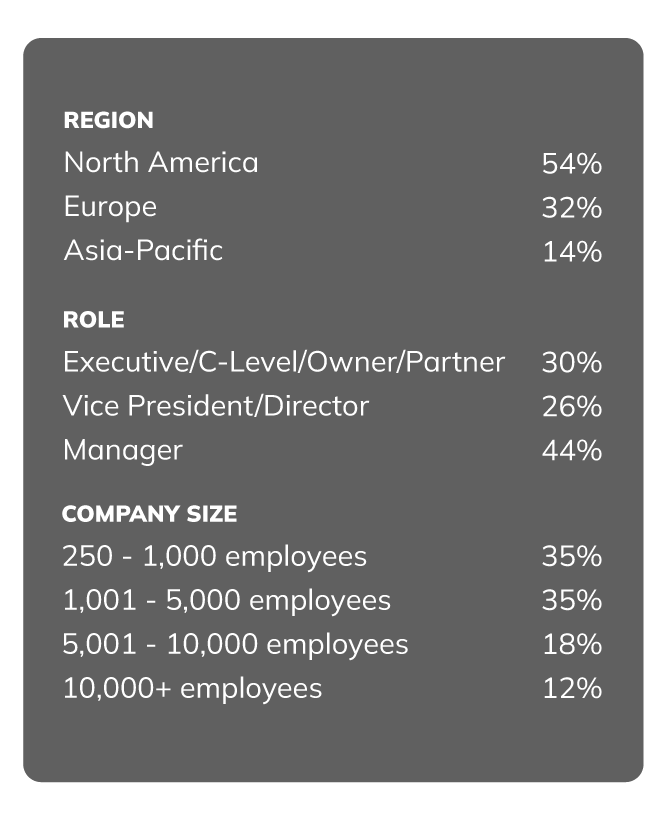The 2024 B2B Marketing Outlook: The Data Confidence Divide
How Marketers Balance Authenticity, AI, and Audience Evolution

You’ve heard it before—confidence is key. Turns out this is especially true when it comes to your data strategy.
Having a solid grip on your data strategy improves performance. B2B marketers who are highly confident that they have the right data strategy in place are 3x more likely than those with less confidence to have seen a significant increase in revenue in the last year. Increased revenue isn't the only thing separating marketers on either side of the data confidence divide; those who are confident are also expanding to new audiences, executing more effective personalization, and feel they can balance authenticity while using AI in their go-to-market strategies.
You can’t be complacent with your strategy. We have data to prove it. Our 2022 report explored how marketers use data, then in our 2023 study we went further to see how B2B marketers are proving value with data. This year we discovered how marketers drive authentic revenue-generating engagement through their data strategy.
Anteriad surveyed 429 marketing leaders across North America, Europe, and APAC to learn how global marketers are feeling about their data strategy, reaching evolving audiences, and fostering authenticity and engagement while using AI.
Key Highlights
Data strategy is a revenue catalyst.
46% of marketers who are confident in their data strategy reported a significant increase in revenue compared to just 15% of their less confident counterparts, highlighting data's pivotal role in driving business growth.
Engagement is top-of-mind.
Engagement is the most valuable scoring element for marketers in 2024, according to 70% of those surveyed. Data quality is the driver of authenticity and better engagement across channels.
Marketers are casting a wider net.
58% are expanding their audience into new demographics and market segments. The shift towards expanding audience demographics underscores the necessity for marketers to adapt and leverage data for personalized, authentic interactions.
Navigating AI and authenticity is a balancing act.
There is some concern about maintaining brand authenticity as AI use increases, but most marketers believe it is possible to strike the right balance. 49% of marketers say it is absolutely possible to strike the right balance, while another 44% believe that it is possible, but it is a tightrope walk.
Data strategy is vital to performance
Confidence in data strategy is directly correlated with improved results. Marketers who report they are highly confident that they have the right data strategy in place are 3x more likely to have seen a significant increase in revenue in the last year.
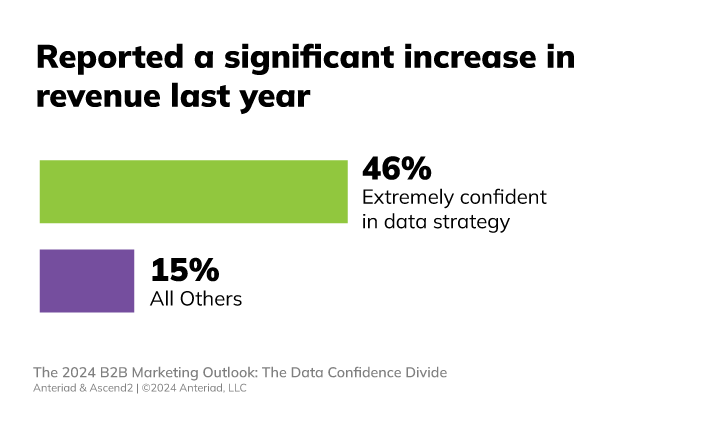
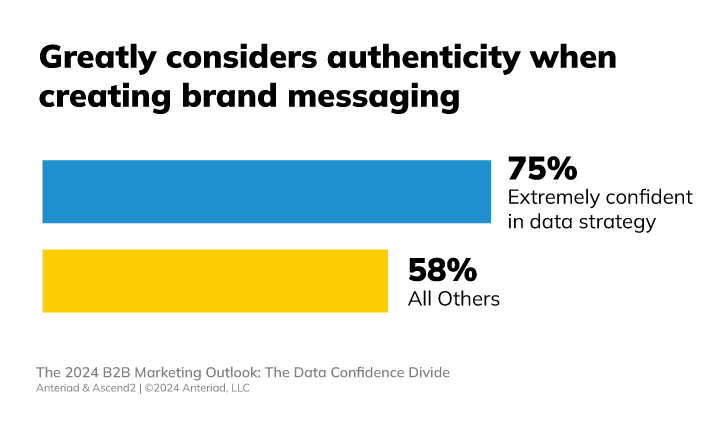
When we dig deeper into the data, we uncover that the marketers with best-in-class data strategies share some unique brand values compared to their peers and place more importance on authenticity, transparency, and innovation. They focus on authenticity to drive engagement throughout the buying journey.
75% of these marketers consider authenticity in brand messaging to a great extent compared to 58% of their peers.
Authenticity drives engagement
Authenticity matters. 59% of all marketers rank authenticity among their most important brand attributes. It’s the most common attribute reported among marketers, ranking above customer-centricity, transparency, consistency, and innovation.
Introducing the Authenticity Acrobats. This high-flying group consists of the 66% of those surveyed who say they consider authenticity in their brand messaging to a great extent. They stand out because they report better outcomes than those who consider authenticity to a lesser extent. Plus, Authenticity Acrobats report more confidence in their data strategy and that they are personalizing campaigns effectively. 54% of Authenticity Acrobats report they are extremely confident in their data strategy compared to just 34% of the rest of the marketers surveyed.
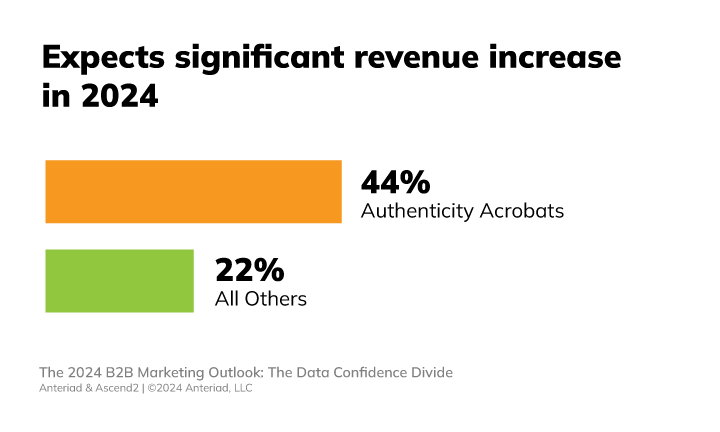
Prioritizing authentic experiences pays off. This group is significantly more likely to have seen significant revenue increases last year than those who put less consideration into authenticity and are 2x more likely to expect to see significant revenue increases in 2024.
Plus, they are targeting and engaging the right audience through their data strategy. 54% of Authenticity Acrobats reported they’re extremely confident in their data strategy compared to only 34% of the rest of those surveyed.
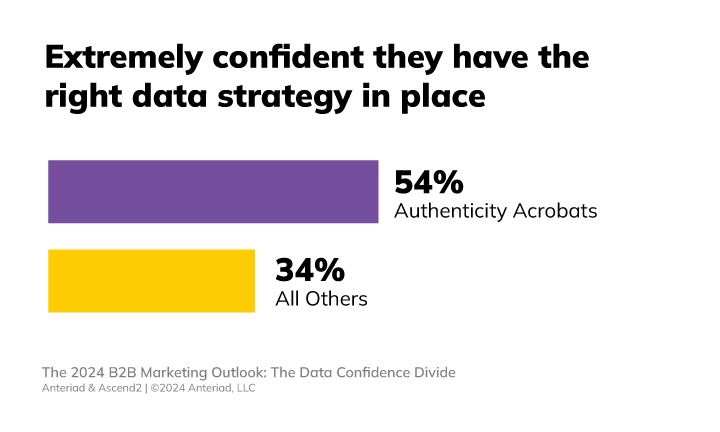
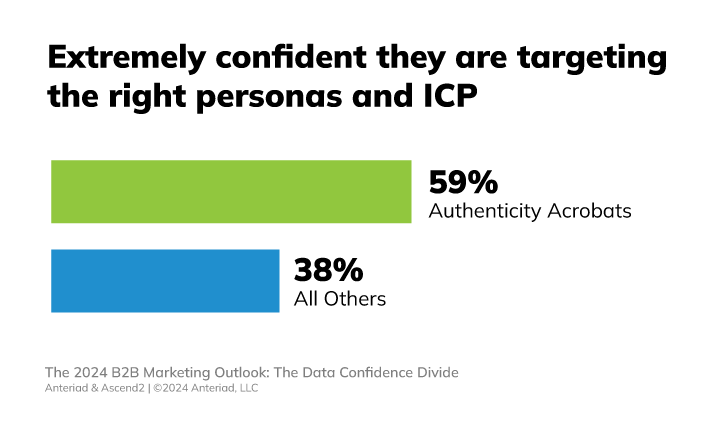
The Authenticity Acrobats focus on authenticity to drive engagement and are more confident in their data strategy and drive more revenue.
You’ve heard it before—confidence is key. Turns out this is especially true when it comes to your data strategy.
 Having a solid grip on your data strategy improves performance. B2B marketers who are highly confident that they have the right data strategy in place are 3x more likely than those with less confidence to have seen a significant increase in revenue in the last year. Increased revenue isn't the only thing separating marketers on either side of the data confidence divide; those who are confident are also expanding to new audiences, executing more effective personalization, and feel they can balance authenticity while using AI in their go-to-market strategies.
Having a solid grip on your data strategy improves performance. B2B marketers who are highly confident that they have the right data strategy in place are 3x more likely than those with less confidence to have seen a significant increase in revenue in the last year. Increased revenue isn't the only thing separating marketers on either side of the data confidence divide; those who are confident are also expanding to new audiences, executing more effective personalization, and feel they can balance authenticity while using AI in their go-to-market strategies.
You can’t be complacent with your strategy. We have data to prove it. Our 2022 report explored how marketers use data, then in our 2023 study we went further to see how B2B marketers are proving value with data. This year we discovered how marketers drive authentic revenue-generating engagement through their data strategy.
Anteriad surveyed 429 marketing leaders across North America, Europe, and APAC to learn how marketers are feeling about their data strategy, reaching evolving audiences, and fostering authenticity and engagement while using AI.
Key Highlights
Data strategy is a revenue catalyst.
46% of marketers who are confident in their data strategy reported a significant increase in revenue compared to just 15% of their less confident counterparts, highlighting data's pivotal role in driving business growth.
Engagement is top-of-mind.
Engagement is the most valuable scoring element for marketers in 2024, according to 70% of those surveyed. Data quality is the driver of authenticity and better engagement across channels.
Marketers are casting a wider net.
58% are expanding their audience into new demographics and market segments. The shift towards expanding audience demographics underscores the necessity for marketers to adapt and leverage data for personalized, authentic interactions.
Navigating AI and authenticity is a balancing act.
There is some concern about maintaining brand authenticity as AI use increases, but most marketers believe it is possible to strike the right balance. 49% of marketers say it is absolutely possible to strike the right balance, while another 44% believe that it is possible, but it is a tightrope walk.
Data strategy is vital to performance
 We’ve seen that having a data strategy is important in our past research. In our 2022 report, we learned that two-thirds of marketers didn’t have a comprehensive data strategy, but those who did were 3x more likely to meet their goals. In 2023, we found that the marketers who are confident they are using the right data were 3x more likely to report significant increases in revenue compared to those who feel less confident that they have the right data. This year’s study continues to build on these findings and highlights that it’s not just having the right data, but being confident you have a strong data strategy that sets you up for success.
We’ve seen that having a data strategy is important in our past research. In our 2022 report, we learned that two-thirds of marketers didn’t have a comprehensive data strategy, but those who did were 3x more likely to meet their goals. In 2023, we found that the marketers who are confident they are using the right data were 3x more likely to report significant increases in revenue compared to those who feel less confident that they have the right data. This year’s study continues to build on these findings and highlights that it’s not just having the right data, but being confident you have a strong data strategy that sets you up for success.
Confidence in data strategy is directly correlated with improved results. Marketers who report they are highly confident that they have the right data strategy in place are 3x more likely to have seen a significant increase in revenue in the last year.
 When we dig deeper into the data, we uncover that the marketers with best-in-class data strategies share some unique brand values compared to their peers and place more importance on authenticity, transparency, and innovation. They focus on authenticity to drive engagement throughout the buying journey.
When we dig deeper into the data, we uncover that the marketers with best-in-class data strategies share some unique brand values compared to their peers and place more importance on authenticity, transparency, and innovation. They focus on authenticity to drive engagement throughout the buying journey.
75% of these marketers consider authenticity in brand messaging to a great extent compared to 58% of their peers.
Authenticity drives engagement
 Authenticity matters. 59% of all marketers rank authenticity among their most important brand attributes. It’s the most common attribute reported among marketers, ranking above customer-centricity, transparency, consistency, and innovation.
Authenticity matters. 59% of all marketers rank authenticity among their most important brand attributes. It’s the most common attribute reported among marketers, ranking above customer-centricity, transparency, consistency, and innovation.
Introducing the Authenticity Acrobats. This high-flying group consists of the 66% of those surveyed who say they consider authenticity in their brand messaging to a great extent. They stand out because they report better outcomes than those who consider authenticity to a lesser extent. Plus, Authenticity Acrobats report more confidence in their data strategy and that they are personalizing campaigns effectively. 54% of Authenticity Acrobats report they are extremely confident in their data strategy compared to just 34% of the rest of the marketers surveyed.
Prioritizing authentic experiences pays off. This group is significantly more likely to have seen significant revenue increases last year than those who put less consideration into authenticity and are 2x more likely to expect to see significant revenue increases in 2024.
Plus, they are targeting and engaging the right audience through their data strategy. 54% of Authenticity Acrobats reported they’re extremely confident in their data strategy compared to only 34% of the rest of those surveyed.


The Authenticity Acrobats focus on authenticity to drive engagement and are more confident in their data strategy and drive more revenue.
Challenges and priorities for 2024
Marketers have a positive outlook for the year ahead.
After a tumultuous couple of years, B2B marketers are seeing the light at the end of the tunnel. They are optimistic about revenue growth in 2024. 30% of those surveyed reported a significant increase in revenue last year, and 37% expect to experience a significant increase in 2024. Additionally, executives believe in their teams and their ability to reach their goals. Over half of executives expect a significant increase in revenue in 2024 compared to just 29% of non-executives.
Beyond that, nearly one-third of marketers (31%) expect significant increases in marketing budget. That’s 2x the marketers who reported a significant increase in budget in 2023.
But it’s not all rainbows and sunshine. While marketers are optimistic, they are still facing challenges, especially when it comes to data. Since we’ve seen that where you stand on the data confidence divide around data strategy can make or break your revenue potential, getting a hold of these data challenges is crucial.

Data quality is a top challenge (and priority).
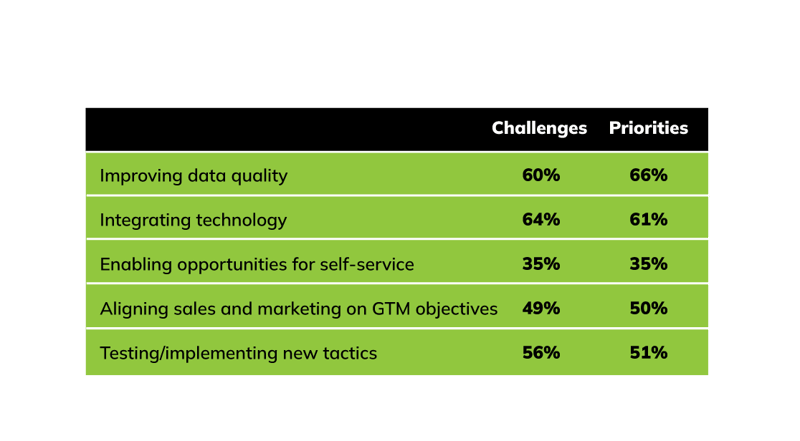
What’s interesting to note is that B2B exclusive companies are facing different challenges than companies that are both B2B and B2C. While overall marketers are challenged by improving data quality and integrating technology, companies that operate exclusively in the B2B space are more challenged by aligning their marketing and sales teams and reaching the right audience than those operating in both B2B and B2C. 56% of those with just B2B initiatives are challenged by marketing and sales alignment compared to just 42% of those with both B2B and B2C initiatives. B2Bs are also significantly more challenged by reaching the right audience compared to those in the B2B and B2C space (69% vs 58%).
Companies that are both B2B and B2C are likely a little ahead of the curve when it comes to the changing B2B buyers journey since they have more exposure to the B2C tactics that customers are now expecting, like personalization. Through these tactics they can deliver a more authentic experience for their buyers and drive engagement.

The power of personalization
Personalization in marketing is becoming more expected—and when B2B marketers aren’t adding personalization to their campaigns their prospects notice. So, it’s good news that 53% of those surveyed are extremely confident in their ability to effectively personalize marketing campaigns.
"We crafted personalized communications and product recommendations by utilizing AI to analyze users' behaviors and preferences. This strategy not only improved our lead conversion rates by over 30% but also enhanced user experience, leading to higher customer loyalty and brand advocacy among our users. It demonstrated the power of personalization in creating more meaningful and effective market interactions."
Rex Liu, Chief Revenue Officer, GoSite

Personalization helps your audience connect to your brand and leads to better results. Those with the most confidence in their ability to effectively personalize marketing campaigns are nearly 3x more likely than others to expect lead pipeline/new lead acquisition to increase significantly in 2024. That being said, it’s no surprise that our Authenticity Acrobats are significantly more likely than others to be extremely confident in their personalization efforts.
"We've successfully tailored email campaigns, product suggestions, and exclusive offers, increasing our lead acquisition rates and bolstering customer loyalty. For instance, our personalized recurring order program has seen a significant uptick, nearly tripling in subscriptions compared to the previous year. This precision in personalization has been instrumental in scaling our pipeline, putting us well ahead of expectations for new lead generation in 2024."
Dan Dillon, CEO, CleanItSupply

Again, it all comes back to data strategy. A strong data strategy is imperative to fueling the personalization that drives authentic experiences that lead to increased engagement and success.
Engagement scoring is soaring
Marketers are putting more importance on tracking engagement scores. Overall, 75% of marketers are using engagement as a scoring element in their marketing programs.
When we look at previous research, the number of marketers using engagement scoring is growing. Using engagement as a scoring element has gone up significantly from last year, from just 57%, to 75% in 2024. Use of buying groups and account scoring have also increased. Marketers are recognizing that having data to track and score their prospects is valuable and they’re making it a priority.
The data also suggests that using engagement scoring leads to increased pipeline. Our Pipeline Powerhouses are more likely to be using engagement as a scoring element than other marketers.

Targeting new and evolving audiences
Many B2B marketers are focused on audience expansion
58% of marketers are working on expanding their audience to new demographics and market segments in 2024. Another 35% report maintaining their current audience targeting strategy, while just 5% will focus on narrowing their audience to more niche markets or specific industries. As businesses look to expand their audience, they must be able to use data to build custom audiences, target the right customers, and deliver the most engaging message.
But this is easier said than done. Two-thirds (63%) of marketers report that reaching the right audience is a top challenge as they work to create continuity in the buying journey. About half of marketers also report that sourcing the right data and determining the right channel mix are top challenges.
Audience expansion can be the key to growing lead pipeline. Our Authenticity Acrobats are more likely to report expanding their audience in the coming year. They’re also 2x more likely to expect an increase in lead pipeline in 2024 than those who don’t value authenticity.
The majority of B2B marketers are using social advertising, search engine marketing, video marketing, and account-based marketing. Channels like content syndication and programmatic advertising are not as highly used, but marketers should consider adding them to their channel mix because they have a positive impact on revenue growth. Overall, about half use 2-3 channels, and the rest use 4 or more channels in a typical campaign.

"We used predictive analytics to uncover underserved sectors that can benefit from our solutions, leading to a 50% growth in entering new markets this past year. And it's not just about expansion; our data strategy also ensures we're constantly enhancing the customer experience. Indeed, our confidence in our data strategy correlates with our financial performance – we're proud to report a 40% increase in revenue, overshadowing industry averages and validating our belief that a robust approach to data is key to success."
Jason Woo, Founder, Able Hardware
Those using both programmatic and content syndication are almost 2x more likely to have seen a significant revenue increase last year.
(Explore this group more in this related guide.)
Overall, marketers are confident they are targeting the right personas, but depending on their job level, some are more confident than others. 51% of marketers report being extremely confident in targeting the right personas and ICP, but when you drill down into the data, this number is skewed by executives being significantly more confident in this than VP/Director and manager titles. 69% of executives report being extremely confident in targeting their audience, compared to only 37% of VPs and directors and 47% of managers. Aligning the whole team on data strategy can help increase confidence in your data-backed campaigns and overarching goals to reach your target audience.
Adapting to changing buyer behaviors
Buyers are looking more to digital channels and peer reviews to research their options before making a purchase decision. Three-quarters of marketers have witnessed an increase in the use of social media for research and decision-making by their target buyers in the last year. The amount of online research and levels of price sensitivity have also gone up.
Since buyers are changing the way they approach the buying journey, smart marketers are adjusting to meet buyers where they are, and seeing it pay off. Marketers who are testing and implementing new tactics were more likely to see significant increases in revenue than those who aren’t. This shows that if you aren’t changing your tactics to keep up with buyer expectations, you risk falling behind your competition.
With this shift to more social media use and online research, marketers are putting authenticity first when presenting their brand. Marketers believe their buyers care about authenticity; 96% report considering authenticity when creating brand messaging—with 66% reporting they consider it to a great extent.

Using data to maximize marketing results
Types of data used
Marketers report demographic, behavioral, and content/campaign data are the most valuable to their efforts. But what is most valuable to one marketer may not be to another. We found significant differences on what types of data were most valuable depending on the marketer’s job function.
"By leveraging behavioral and transactional data, we can deeply understand our customers and deliver highly relevant, personalized touchpoints across channels."
Wendy Wang, Owner, F&J Outdoor
Marketing communications respondents, for example, value technographic data significantly less than their peers but value demographic data significantly more than most. Campaign and digital media marketers place high value on behavioral data, while demand gen marketers place intent data at the top of their list.
But it’s not just demand gen marketers who see the value in intent data; those who use engagement scoring find significantly more value in intent than those who don’t use this scoring methodology. Marketers who are confident in their data strategy are also much more likely to use intent data than their peers.
The data marketers are using has a high impact on the results they’re seeing. Those who are confident they have the right data are seeing a direct impact—more revenue. How they acquire high-quality data and how they use it across their efforts play a role in the results they deliver.

Using data for cross-channel personalization
Multichannel campaigns are making an impact. Nearly half of marketers are using 4 or more different channels in a typical marketing campaign. Those who are running multichannel campaigns are seeing benefits like more revenue and pipeline growth, plus reaching audiences across channels may allow marketers to tailor more engaging and authentic messaging.
Marketers who reported significant revenue increases last year are more likely to be using 4 or more channels, as are marketers who expect significant increases in lead pipeline. 58% of the Pipeline Powerhouses are using 4 or more channels compared to 43% of their peers.
Delivering a consistent message to prospects across channels helps marketers feel confident they are delivering an authentic brand message. Authenticity Acrobats are using more channels than others in their marketing campaigns, with 55% of this cohort using 4 or more channels vs 33% of other marketers.
When it comes to personalization, B2B marketers are taking advantage of as much data as they can. Overall, the most commonly used data points used for effective personalization are demographic data (67%), social media activity (58%), purchase history (56%), and geographical and location data (55%). However, those most confident in their personalization efforts are significantly more likely to use demographic data, social media activity, interactions with content, and technographic data than those with less confidence.
"Using machine learning algorithms, we analyzed purchasing patterns and online behavior to tailor marketing messages that resulted in a 40% uplift in customer retention and a 25% increase in sales. This underscores the critical role of personalization in contemporary digital marketing strategies."
Joe Amaral, Founder, Anthem Software
At a certain point, more data doesn’t necessarily bridge the data confidence divide. In fact, it looks like the sweet spot for confidence in personalization is using 3 to 6 data points. Two-thirds of the group that is extremely confident in their use of personalization use 3 – 6.
Intent data improves personalization
The power of intent data shines through. Using intent data puts marketers on the right side of the data confidence divide. Those using intent data to fuel their personalization feel confident and see growth. They’re more confident in their targeting and account-based marketing efforts.
Those using intent data for effective personalization are significantly more likely to report being extremely confident in targeting the right personas and ICP than those not using intent data (57% vs 48%).
"Users can download free guides on our website, for example, if they input their name and email address. The guide they choose to download helps us better understand their unique pain points so we can follow up with a relevant email campaign or share a related case study. Tailoring outreach to a B2B prospect's specific interests helps nurture more leads and build deeper connections."
Rex Huxford, Director of Demand Generation, MD Clarity
And this confidence is rooted in real results. Those using intent data for effective personalization are more likely to have seen a significant revenue increase last year than those not using intent data (35% vs 27%). Since their tactics are working, they’re more likely to build on this success and expand their audience; 62% of intent data users report audience expansion into new demographics and segments in 2024 compared to 56% of those not using intent data.
There are some interesting differences between the types of companies that use intent data for personalization and those that don’t; large North American companies are the most likely to use intent, and smaller European companies are the least likely.

The impact of AI
Marketers are concerned but optimistic
Navigating AI is like walking a tightrope. It’s all about balance. Despite some concerns about maintaining brand authenticity while using AI, many marketers believe it is possible to strike the right balance.
"We employ AI-driven analytics to segment our customer base, customizing our interactions based on their preferences and behavior, thus creating a unique and authentic brand experience."
Gianluca Ferruggia, GM, DesignRush
Nearly half of marketers say that it’s absolutely possible to strike a perfect balance to maintain brand authenticity while incorporating AI into their GTM strategies. But there is a big confidence divide separating generations. Confidence around the ability to balance use of AI and brand authenticity is the highest in younger generations of marketers; 56% of Millennial and Gen Z marketers believe that it is possible to strike the perfect balance between authenticity and using AI, compared to 42% of Gen X marketers and just 29% of Boomers.
Looking at titles, executives have a more positive outlook on AI. Executives are more likely to report a positive impact from the use of AI on brand characteristics such as authenticity, innovation, and transparency.
AI authenticity concerns aren’t bothering the Authenticity Acrobats. In fact, they are significantly more confident than the rest of the data set that they can absolutely strike a perfect balance in brand authenticity and the use of AI in their GTM strategies.

"Despite the concerns, we believe in the synergy between human creativity and AI efficiency. Our marketing strategy incorporates AI for data analysis and insights, while ensuring that the final creative output resonates with our brand voice and values. By adopting a hybrid approach, where AI supports but does not overshadow our human-led marketing efforts, we've maintained our brand's authenticity and connected more deeply with our target audience."
Rex Liu, Chief Revenue Officer, GoSite
On the bright side, 7 in 10 marketers feel that generative AI can have a positive impact on innovation and consistency. But, on the more cautious side, 18% worry that it could negatively impact authenticity.
Pipeline Powerhouses view generative AI positively. This is likely because they’ve already overcome the data confidence divide and are confident enough in their strategy to test new tools and tactics. This confidence gives them leeway to take more chances and find out what works when it comes to AI.
Next steps
In the midst of today’s data confidence divide, it’s important that you take steps to improve your strategy and prioritize data. The findings of this research offer insight into where you can focus your efforts:

- Focus on data quality. Data quality is a top challenge for marketers today, but prioritizing it improves your overall strategy and allows you to drive better results. Start by addressing data hygiene concerns by cleaning up your data and creating a strong data management process going forward. If you’re not sure of the best place to start, work with a trusted data provider.
- Keep an eye on engagement scores. B2B marketers reported that engagement scoring is the most valuable scoring methodology. If you aren't already using it, add engagement scoring to your lead scoring strategy. Track how your prospects are engaging with your campaigns and use that data to improve personalization and optimize outreach.
- Test out new audiences. Many marketers are finding success with wider audience pools. Take a look at your data and consider expanding to new audiences if you see the opportunity. Remember, successful marketers are layering many types of data, so you may need to work with a data provider to fill gaps in your data in order to reach new audiences.
- Embrace AI, but don’t forget about authenticity. Since AI is a bigger player in the game than ever, it’s time to test out your balance. Start small and find ways your team can leverage AI to save time and foster innovation and creativity. Be careful not to rely solely on AI for content creation; the human touch is still important to ensure authenticity in your brand messaging. Once your team becomes more comfortable using the technology and discovers the tools that work best for your brand, you can use AI across additional use cases with confidence that you can still deliver an authentic experience.
You can have this insightful report sent straight to your inbox.
Methodology
